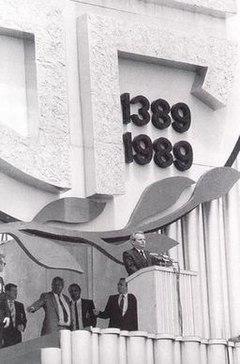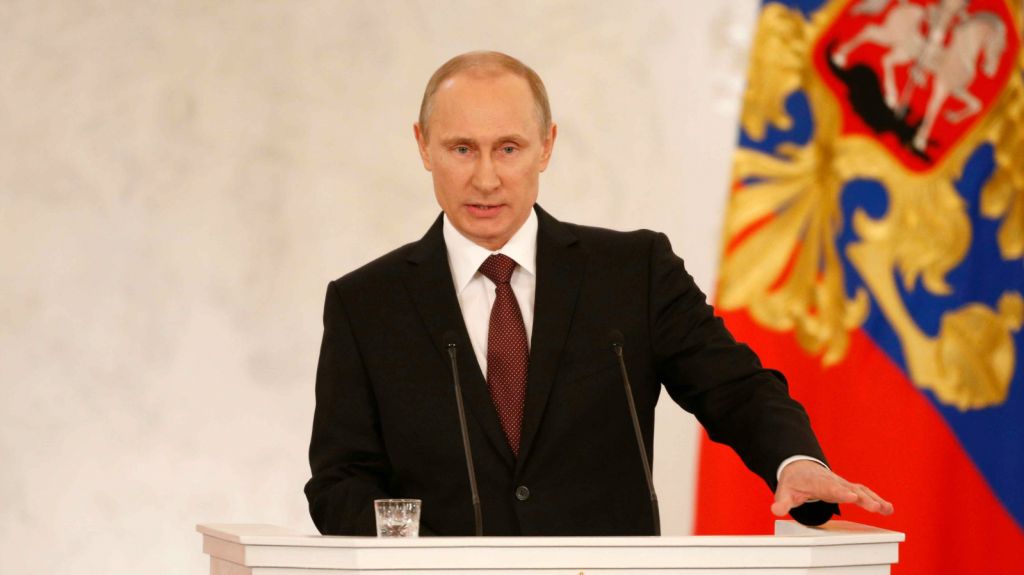By Ethan Kopp
Professor Veljko Vujacic’s March 6 lecture on nationalism, populism, and rhetoric in Serbia and Russia as a result of political decay powerfully illustrated comparable themes between Milosevic’s Serbia and Putin’s Russia. The first lecture in the spring colloquium series on populism in Eastern Europe sponsored by the Havighurst Center for Russian and Post-Soviet Studies, Vujacic first compared the ethno-territorial federalism that developed both in Yugoslavia and the USSR on an ideological and institutional dimension. This ethno-federalism led to the development of strong national identities, even within the ideologically unified larger blocs. When these unifying ideologies began to decay, nationalism emerged as a predominant force in both countries, ultimately leading to ethnic tensions and violence.
The violence was heightened as leaders in both countries rhetorically played to the national mythos of the country and cast Serbs and Russians living in other countries as oppressed minorities. For example, in the case of former Yugoslavia, Serbian leader Slobodan Milosevic argued with populist zeal that it would never concede Kosovo to the Albanian majority, playing to the mythos of historical Serbian defiance and sacralizing Kosovo as the birthplace of Serbian statehood. Similarly, Vladimir Putin sought to sacralize and sanctify Crimea, officially part of Ukraine, as a cornerstone of Russian history and a significant center for Russians living in Ukraine. Vujacic argued that political decay and crises of legitimacy, exemplified through effects such as the declining appeal of official ideology, lends credence to leaders who channel resentment and strategically articulate popular grievances. Political decay then helps to feed the resonance of nationalist and populist rhetoric employed by leaders such as Putin and Milosevic.
Beyond his definition of the problem at hand, Vujacic’s main argument centered on four aspects that further the resonance of nationalist appeals. They include national myths and collective memories, status honor, the instrumental use of nationalism, and the power of ressentiment. Contending with the first, Vujacic asserted that national myths and narratives could be activated during crises, triggering nationalist action, such as Milosevic did with the historical memory of Serb victories over past occupiers. As an important caveat to this factor, Vujacic explained that these myths constrain the number of choices political actors can take, meaning that once a narrative is espoused, it cannot be turned back. Thus, this factor frequently yields violent outcomes.
Another factor Vujacic considered was status honor and prestige, which has broad appeal as it allows one to feel superior to non-members of the nation regardless of social class. To this end, frequent solutions to nationalism, such as economic development, have not served to alleviate it but, in many cases, have served to strengthen it. Third, Vujacic explored the instrumental use of nationalism by leaders, suggesting that leaders seek to maximize power by implementing nationalist rhetoric as a means to an end. It therefore becomes difficult to disentangle leaders such as Milosevic’s and Putin’s actual beliefs from the rhetoric they strategically employ. Finally, Vujacic employed Max Scheler’s notion of ressentiment, which refers to a lasting attitude caused by systematic repression of emotions such as revenge, envy, and malice. He argued that nationalism and its successes are not contingent on national strength but rather on national weakness relative to other states.
Vujacic also considered four elements of nationalism that are often overlooked. In giving empirical evidence to his four aspects of nationalism, Vujacic analyzed speeches from Putin to illustrate each element. Utilizing a speech from Putin justifying his invasion and annexation of Crimea, he discussed how Putin strategically implemented appeals to national myths, such as sacralizing Crimea as the place where Prince Vladimir was baptized and where Russians died defending it in 19th and 20th Century wars. Milosevic used a similar rhetorical strategy in his 1988 speech that appealed to the national myth of Serbians as resilient victors against invaders such as the Ottomans, Austro-Hungarians, and Germans.
While Vujacic focused on Milosevic and Putin, his analysis could be applied elsewhere, particularly in the case of Hungarian Prime Minister Victor Orbán’s strategic implementation of similar rhetoric to justify his illiberal and often anti-democratic policies. Vujacic’s argument of ressentiment and appeals to the national mythos as crucial elements of resonance for nationalist appeals resemble Orbán’s use of the Treaty of Trianon and the infamous legacy of the round table talks extrication in both Hungary and Poland.
Vujacic’s lecture left me with several questions about his findings. First, is there a measurable point at which a leader’s rhetoric loses appeal to a population and can no longer justify a leader’s actions? For example, can one predict or define a point at which will Orbán’s strategically nationalistic and populist rhetoric no longer justify his actions? Additionally, considering Vujacic’s point that nationalism, when stirred, does not quickly dissolve, what are the long-term effects of the strategic use of nationalism and populism by Eastern European leaders? I fear that future conflict and ethnic clashes could be a ramification of the rhetoric of these leaders, as has been the case in former Yugoslavia.
Ethan Kopp is a senior majoring in Political Science


